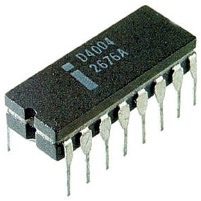Who Invented the Microprocessor?...Hyatt v. Patent Office
Sunday, February 19, 2012
 Intel 4004 (photo: Wikipedia)
Intel 4004 (photo: Wikipedia)
In the early days of the computer industry, companies like Texas Instruments and Intel were racing to become the first to invent a microprocessor chip, the computation engine on a single wafer otherwise known as a central processing unit, or CPU.
Intel claimed victory in 1971, patented its creation and was generally regarded as the inventor of the microprocessor upon which the desktop computer industry was built. But in 1990, the U.S. Patent and Trademark Office reversed its decision and awarded that recognition to Gilbert Hyatt of La Palma, California, who had submitted a microprocessor patent application in 1970.
In anticipation of earning millions for his invention, Hyatt moved to Nevada, where the tax laws were more favorable, and in 1991 he received a $40 million payment for licensing his patent. The Franchise Tax Board (FTB), which claimed Hyatt had been a citizen of California at the time of his windfall, audited him and in 1995 said he owed substantial taxes and a huge penalty payment for fraud.
In the meantime, the patent office conducted a five-year proceeding to determine if yet another competing patent claim had any substance and in 1996 reversed its decision and recognized former Texas Instruments engineer Gary W. Boone as the inventor of the single-chip microprocessor. The patent office said Hyatt’s device as designed was not implementable with the technology available at the time. By then, Hyatt had netted at least $70 million in licensing fees and sued in federal court to overturn the patent office’s determination.
Hyatt also fought back against the FTB and sued the board in Nevada in 1998. He claimed that the FTB broke the law during its investigation of him, “including invasion of privacy, outrageous conduct, abuse of process, fraud and negligent misrepresentation.” Bill Leonard—a former California state legislator and member of its other big tax collection agency, the Board of Equalization—described the FTB’s behavior this way: “Tax agents rummaged through his trash without warrants, visited business partners and doctors, and shared his Social Security Number and other personal information with the media. . . . What really galled me is the FTB testified in open court that this level of harassment was only a typical audit. If true, then the storm troopers are alive and well at the FTB.”
The FTB argued that it couldn't be sued in Nevada courts, but in 2003 the U.S. Supreme Court unanimously sided with Hyatt and the case proceeded to trial. In the meantime, the FTB’s Protest Division issued a final ruling on the original board claim against Hyatt, upholding its determination that he owed California back taxes and a penalty. Hyatt appealed to the California Board of Equalization in 2007.
In August 2008, a Las Vegas jury returned a verdict in Hyatt's favor, awarding him $138 million in compensatory damage and $250 million in punitive damages. The FTB’s request for a new trial was denied and it appealed to the Nevada Supreme Court.
In March 2011, while Hyatt’s appeal of the FTB ruling and the FTB’s appeal of the Nevada trial court were pending, the California State Controller got involved by issuing subpoenas for out-of-state records and depositions in New York as part of the FTB hearing. Hyatt appealed to the New York State Supreme Court to quash the subpoenas and take other legal action to protect him. The court’s decision was a mixed bag of seven rulings allowing the FTB to issue the subpoenas but within certain limitations.
The Nevada Supreme Court has received all legal briefs from Hyatt and the FTB, and is preparing for oral arguments in the 40-year-old dispute.
Hyatt’s appeal of the patent office decision reversing his patent claim also made it to a high court, the U.S. Supreme Court, where he argued that the courts had improperly disallowed new information that he had presented to make his case. That case is also pending.
-Ken Broder
To Learn More:
Kappos v. Hyatt (Legal Information Institute)
Obtaining New York Subpoenas for Out-of-State Proceedings (by Victor M. Metsch, Hartman & Craven LLP)
California Loses Big in Litigation Involving Its Tax Jurisdiction and Related Residency Audits (by David Nolte, HGExperts)
The Franchise Tax Board’s Conduct Could Cost California $500 Million (by Paul Hatfield, Village to Village)
Extraterritorial Audits, Tax Competitors, and Narratives: Hyatt (by Steve R. Johnson, Florida State University College of Law) (pdf)
The Intel 4004 (by Federico Faggin)
For Texas Instruments, Some Bragging Rights (by John Markoff, New York Times)
Chip Designer's 20-Year Quest : Computers: Gilbert Hyatt's Solitary Battle to Patent the Microprocessor Appears to have Paid Off, if it Can Withstand Legal Challenges. Here's His Story (by Dean Takahashi, Los Angeles Times)
- Top Stories
- Unusual News
- Where is the Money Going?
- Controversies
- U.S. and the World
- Appointments and Resignations
- Latest News
- Trump Renames National Football League National Trump League
- Trump to Stop Deportations If…
- Trump Denounces World Series
- What If China Invaded the United States?
- Donald Trump Has a Mental Health Problem and It Has a Name






Comments